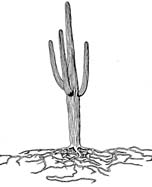 |
DIVISION
OF PLANT PATHOLOGY & MICROBIOLOGY |
|
|
||

Dr. Michael A. McClure e-mail: mcclure@ag.arizona.edu |
||
|
|
||
| Area of Interest: Biology and control of plant parasitic nematodes; ultrastructure of nematodes and host-parasite interactions. |
||
|
|
||
| Research Goals: Nematodes are omnipresent. They occupy almost every conceivable niche that is capable of supporting life, and are purported to be the most numerous animals in the world. Plant parasitic species that attack cultivated crops in the USA are responsible for damage exceeding $9,000,000,000 annually. I am interested in the interactions of nematodes with their host plants at the organismic, cellular, and molecular level. Currently my research is focused on the nematode surface coat, the outermost boundary between the nematode and its environment. Nematode survival is dependent upon exchange of materials across this boundary and through the body wall. The surface coat may also mediate host-parasite recognition systems, and is involved in the attachment of bacteria and fungi that parasitize nematodes. Immunological, biochemical, and ultrastructural methods are being utilized to characterize the surface coat and determine its origin. On the more practical side, my research interests include nematode population management by biological, cultural, and chemical methods. Experimental approaches include laboratory, greenhouse, and field experiments with a broad spectrum of biological and chemical agents, as well as cultural methods, to reduce nematode populations and sustain crop yields. |
||
|
|
||
| Selected Publications:
Gravato-Nobre, M. J., McClure, M. A., Dolan, L., Calder, G., Davies, K. G., Mulligan, B., Evans, K., and Von Mende, N. 1999. Meloidogyne incognita surface antigen epitopes in infected arabidopsis roots. Journal of Nematology 31:212-223. McClure, M. A. and M.E. Schmitt. 1996. Control of citrus nematode with cadusafos. Journal of Nematology 28: 624-628. Ogallo, J.L., and McClure, M. A.. 1996. Systemic acquired resistance and susceptibility to root-knot nematodes in tomato. Phytopathology: 86:498-501 Ogallo, J.L. and M.A. McClure. 1995. Induced resistance to Meloidogyne hapla by other Meloidogyne species on tomato and pyrethrum plants. Journal of Nematology 27:441-447 Spiegel, Y. and M.A. McClure. 1995. The surface coat of plant parasitic nematodes: chemical composition, origin and biological role - a review. J. Nematol. 27(3):127-142 Ogallo, J.L. and M.A. McClure. 1995. Induced resistance to Meloidogyne hapla by other Meloidogyne species on tomato and pyrethrum plants. Journal of nematology 27:502-510 Spiegel, Y. and M.A. McClure. 1995. The surface coat of plant-parasitic nematodes: Chemical composition, origin, and biological role -- Review. Journal of Nematology 27:127-134< McClure, M.A. and Y. Spiegel. 1991. Role of the nematode surface coat in the adhesion of Clavibacter sp. to Anguina funesta and Anuina tritici. Parasitology 103:421-42. McClure, M.A. and N. von Mende. 1987. Induced salivation in Plant Parasitic Nematodes. Phytopathology. 77(10):1463-1469 McClure, M.A. and A.F. Bird. 1976. The Tylenchid (Nematoda) egg shell: formation of the egg shell in Meloidogyne javanica. Parasitology. 72:29-39 McClure, M.A., Misaghi, I. and E.L. Nigh. 1973. Shared antigens of parasitic nematodes and host plants. Nature. 244(5414):306-307 |
||
|
|
||
|
For more information contact: Dr. Michael A. McClure Office Phone: (520)621-7161 |
||
|
|
||
|